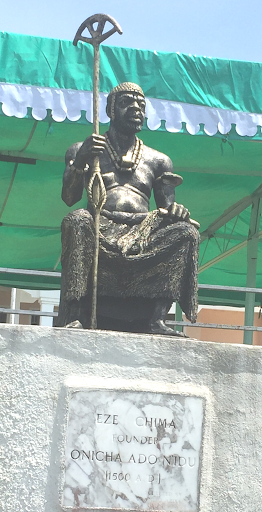In the National Standard October 2016 Special Edition – A New Dawn In Bini Kingdom – in commemoration of the coronation of the new Oba of Benin, Oba Ewuare II, the magazine presented a rich package bristling with detailed accounts of the Bini history including an exclusive interview with Igwe Alfred Nnaemeka Achebe, the Obi of Onitsha, who categorically affirmed that “Benin is our ancestral home”. His response to the historical link between Onitsha and Benin went thus:
Narration From Obi of Onithsa About Onitsha
You will see it in our royal traditions as there are certain similarities between the royal Benin traditions and ours. We have been in Onitsha for over 600 years and as you would expect certain influences have come in over the years and even at the point of crossing the Niger and the Igala people assisted in the crossing over. So, ever since then, the Igala influence has been there from the beginning and the royal court of Onitsha has established a long standing relationship with the Igala royal court.
Having settled in these parts, which are a part and parcel of the Igbo nation, the Igbo influences have come. So, Onitsha today has the Edo influence which we call the Ado. The full name of Onitsha is Onitsha-Ado N’idu showing we originated from Benin; the Igala influence is the ‘Idu’ element and the Igbo influence. So there is a royal tradition from Benin, Igala and our social tradition is mainly Igbo because we have interacted with them; then our spiritual tradition is largely Igala and to some extent Igbo. So, these are connections with Benin. It is historical and it is traditional.
When Was Onitsha Founded
On the assertion that it was after the war with the Igalas (Idah) during Oba Esigie’s reign that the Bini warriors came down the river to found Onitsha, Obi Achebe debugged this view thus:
No, all our handed down history tells us that the migration was eastwards through Agbor through the other communities, so we have ancestral relationship between communities west of the Niger, so you can imagine it was a migration that took place over generations. You move and you stop. Then the migration continues, and some would decide to stay back whilst others would join, and this continued until they got to Onitsha. By the time they got to Onitsha, they had picked up traditions from different places.
Obior was the community where Eze Chima was buried and his throne still sits there and we pay pilgrimage to Obior till date. Obior is a town in Delta State. So in Onitsha today, we have an Obior Clan, an Isele Clan, an Obolo Clan, etc. So, all of us make up Onitsha as we have it today. Concerning the migration down the River, the Igala influence came subsequently and we do have distinct Igala communities in Onitsha. We call them the Obolu Clan comprising a number of clans who are the descendants of the Igala migrants and they still maintain some elements of the Igala culture.
An Appraisal of the Origin Legends of Benin and Onitsha Peoples.
It is important to note that when oral historical narratives about the origins of peoples, generally are without coercion and substantive amongst historians and people at large, then one could deduce or conclude that the objective consensuses are grounded on fundamental reality, that is, facts.
Subscribing to the general idea of looking towards Egypt or the Sudan or ascending from heaven as the source of origin of the Binis is like succumbing to mythology or folklores as facts of history. There are no scientific supports to this figment of the imagination. No historical tools of investigation, particularly archaeology, support this assertion. They seem to be conjectural. However, further research is required in this respect to unravel the thorny issue of this origin legend of Benin.

